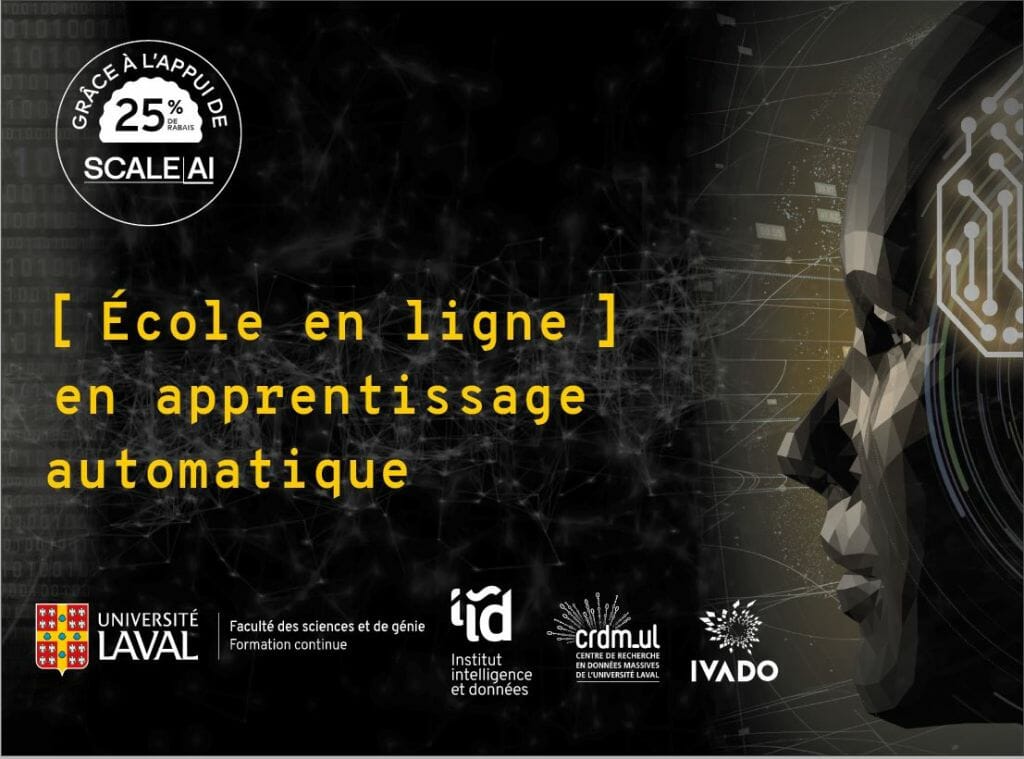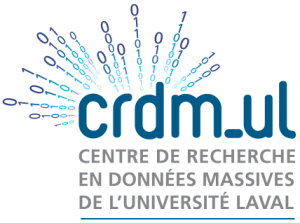Online School in Machine Learning
A new edition – entirely online – of the School in Machine Learning will be offered from June 1 to 19, 2020 by the Continuing Education Program and CFDD (Faculty of Science and Engineering), Université Laval Big Data Research Center and IID, with the support of IVADO. This training program will allow you to learn more about the field of artificial intelligence and its applications in your workplace or as part of your university studies program.
Date
- 01 June 2020
- 02 June 2020
- 03 June 2020
- 04 June 2020
- 05 June 2020
- 08 June 2020
- 09 June 2020
- 10 June 2020
- 11 June 2020
- 12 June 2020
- 15 June 2020
- 16 June 2020
- 17 June 2020
- 18 June 2020
- 19 June 2020
Time
09h00 to 17h00 09h00 to 17h00 09h00 to 17h00 09h00 to 17h00 09h00 to 17h00 09h00 to 17h00 09h00 to 17h00 09h00 to 17h00 09h00 to 17h00 09h00 to 17h00 09h00 to 17h00 09h00 to 17h00 09h00 to 07h00 09h00 to 17h00 09h00 to 17h00
Location
Online
Cost
From $500 to $1500
A new formula, entirely online

Training offered in French
This edition of the School in Machine Learning allows participants to complete the training program entirely remotely at a pace that suits their schedule. In addition to benefitting from the teaching provided by professors from the Faculty of Science and Engineering, participants will benefit from support during practical exercises provided by a team of experts.
This online formula offers participants 24/7 access to a contextual forum where they can exchange views with their peers and obtain feedback from instructors via a unique, distinctive learning platform developed within the Faculty. They will also be able to speak directly with our experts during the 5 live question sessions scheduled at different times during the training program. Participants will leave with a practical and applied knowledge of machine learning that will give them the confidence to make thoughtful strategic decisions and initiate change in their organization.
Machine learning is an area of artificial intelligence that combines a set of computer science and statistical tools that enable the computer to “learn” from data. The computer can then perform tasks or answer questions automatically without explicitly requiring programming.
With the digital transformation well underway, all sectors should now integrate these new technologies into their business processes to remain competitive. Techniques are continually improving and the need for professionals trained in this approach is growing exponentially.
This training program, now in its third edition, will allow participants to take part in projects in their field and provide them with the necessary background to pursue their learning in their work, research or study environment.
Possible applications of machine learning in your professional activities:
- Risk management
- Management of orders and complaints, optimization of inventory levels
- Protection of personal data
- Customer knowledge (understanding customer behaviour and preferences
- Autonomous driving
- Adapt cultivation techniques to the weather (agriculture sector)
- Predictive maintenance
- Voice recognition and handwriting
Goals
Upon completion of this training program, the participant will be able to:
- Identify the problems encountered in business that can be solved by machine learning
- Determine the advantages and limitations of the machine learning paradigm
- Set the requirements for the appropriate implementation of a learning pipeline
- Solve problems using machine learning techniques
Clientele
- Computer scientists and other information technology professionals
- Engineers
- Actuaries
- Scientists and researchers
- Full-time graduate students in a related discipline
Prerequisites
- Being able to program or interpret a programming language
- Possessing an introduction to Python programming languages
Viewing a tutorial is recommended for participants unfamiliar with the basics of Python. If necessary, consult chapters 2 to 10 of Gérard Swinnen’s book to complete the exercises.
A tutorial briefly explaining convolutions in Python will allow you to better appreciate their syntax and uses.
Program of virtual sessions
Monday, June 1
1 pm – 2 pm
Opening Webinar
Wednesday, June 3
1 pm – 2 pm
Ask your questions
François Laviolette
Friday, June 5
1 pm – 2 pm
Ask your questions
Marie-Pier Côté
Wednesday, June 10
1 pm – 2 pm
Ask your questions
Christian Gagné
Friday, June 12
1 pm – 2 pm
Ask your questions
Patrick Dallaire
Wednesday, June 17
1 pm – 2 pm
Ask your questions
Philippe Giguère
Friday, June 19
1 pm – 2 pm
Closing Webinar
Instructors
Full Professor, Faculty of Science and Engineering, Université Laval
Director, Big Data Research Center (CRDM),
Canada-CIFAR Artificial Intelligence Chair
NSERC/Intact Financial Corporation Industrial Research Chair in Machine Learning for Insurance
François Laviolette is a Full Professor in the Department of Computer Science and Software Engineering at Université Laval. His research interests focus on artificial intelligence, in particular machine learning.
He is a leader in PAC-Bayesian theory, which provides a better understanding of machine learning algorithms and enables the design of new algorithms. He takes a special interest in designing algorithms which solve learning problems related to genomics, proteomics and drug discovery. He is also interested in rendering artificial intelligence interpretable in order to better integrate systems where humans are involved in the decision loop.
He is the director of the Big Data Research Center (CRDM) at Université Laval, which brings together more than 50 researchers.
Full Professor, Faculty of Science and Engineering, Université Laval
Director, Institute Intelligence and Data (IID)
Canada-CIFAR Artificial Intelligence Chair
Christian Gagné has been a professor in the Department of Electrical and Computer Engineering at Université Laval since 2008. He is the Director of the Institute Intelligence and Data (IID) at Université Laval. He holds a Canada-CIFAR Artificial Intelligence Chair and is an associate member of Mila. He is also a member of the Computer Vision and Systems Laboratory (CVSL), a component of the Robotics, Vision and Machine Intelligence Research Centre (CeRVIM) as well as the Big Data Research Center (CRDM) at Université Laval. He is a member of the REPARTI and UNIQUE FQRNT strategic networks, the VITAM center of the FRQS and the International Observatory on the Societal Impacts of AI and Digital Technology (OBVIA).
He received a Ph.D. in Electrical Engineering (Université Laval) in 2005 and then completed a joint postdoctoral internship at INRIA Saclay (France) and the University of Lausanne (Switzerland) in 2005-2006. He worked as an industrial research associate between 2006 and 2008. He has been a member of the executive committee of the ACM Special Interest Group on Evolutionary Computation (SIGEVO) since 2017.
His research interests include method development for machine learning and stochastic optimization. In particular, he is interested in deep neural networks, representation learning and transfer, meta-learning as well as multitasking learning. He is also interested in optimization approaches based on probabilistic models as well as evolutionary algorithms, involving black box optimization and automatic programming. Much of his work also focuses on applying these techniques in areas such as computer vision, microscopy, health, energy and transportation.
Associate professor, Faculty of Science and Engineering, Université Laval
Codirector, Norlab
Research Thrust Leader: Physical Environment, IID
Philippe Giguère, Eng. (B. Eng: Engineering Physics U. Laval, M.Sc.A.: Northeastern U., Ph.D.: U. McGill) has been an Assistant Professor in the Department of Computer Science and Software Engineering at Université Laval since 2010. He has more than 10 years of expertise in robotics and sensors, in addition to accumulating 6 years of experience in a private company on computer or on-board systems. He directs research in mobile robotics (Norlab) and artificial intelligence (DAMAS laboratory).
The main objective of his research is to increase the degree of autonomy of cyber-physical systems (intelligent robots), through the application of machine learning or data fusion methods. His projects in recent years have touched on computer vision, 3D point cloud processing, localization, gripping and tactile perception. He is a member of: (i) the FRQNT-REPARTI Cyberphysical Systems and Embedded Machine Intelligence Strategic Network, (ii) the Big Data Research Center (CRDM) of Université Laval and (iii) the NSERC Canadian Field Robotics Network (NCFRN).
Associate Professor, Faculty of Science and Engineering, Université Laval
Marie-Pier Côté is an Assistant Professor at the School of Actuarial Science at Université Laval, a Fellow of the Society of Actuaries, and she holds an Educational Leadership Chair (ELC) in Big Data Analysis for Actuarial Science – Intact.
Professor Côté received a Master’s (2014) and a Ph.D. (2018) in Statistics from McGill University. Her research interests include insurance risk dependence modeling and the development of statistical learning models for pricing and reserves in general insurance. She has co-authored several articles and collaborates closely with partners in the insurance industry in her research and is a member of the Big Data Research Center at Université Laval.
Training program details
- Fully remote program – 35 hours spread over a period of 3 weeks
- Infrastructure and equipment (theory and exercises) fully accessible from the first day to respect the pace of each participant via the PAX eXperiential Learning Platform
- An estimated 15 hours for interactive practical exercises in a Jupyter environment
- 6 hours of live sessions with the professors associated with each module
- Live sessions fully recorded and available at all times
- Assistance via a contextual forum during practical exercises by a team of graduate student researchers
- 5 video summaries
- Each participant must have a laptop with a minimum capacity of 8 GB of RAM
- Prerequisites: Use an up-to-date web browser such as Chrome, Firefox, Edge or Safari
Training Activities, in detail
Introduction to Machine Learning
At the end of this module, the participant will be able to:
- understand the machine learning programming paradigm;
- understand the main forms of learning;
- understand the concepts of generalization and overfitting;
- apply a rigorous machine learning methodology;
- understand the main supervised learning algorithms;
- understand the ethical issues and the limits of machine learning algorithms.
Application of linear regression methods
At the end of this module, the participant will be able to:
- understand the foundations of linear models and their extensions;
- apply the inference methods for a linear model;
- select the explanatory variables; use a linear model to make predictions.
Supervised learning (classification)
At the end of this module, the participant will be able to:
- understand the foundations of the different classification algorithms;
- apply the correct classification algorithms according to the application context;
- understand the effect of hyperparameters on the generalization error.
Model evaluation and selection
At the end of this module, the participant will be able to:
- understand the concept of metrics; understand the main classification and regression metrics;
- compare models on the basis of certain metrics;
- use a metric in a methodological model selection framework;
- understand the metrics to counter the imbalance of classes.
Introduction to deep learning
At the end of this module, the participant will be able to:
- understand how a neural network works;
- understand the main loss functions for neural networks;
- understand the structure of a neural network;
- understand the different optimization techniques by descent of the gradient;
- train a neural network with a methodological framework.
Price
Regular Price: $1 500
Scale AI 25% Discount: $1 125 (details and admissibility below)
Price for a Full-time Student: $500
Scale AI accredited training program
Register for this Scale AI accredited training program and receive a 25% discount off the regular rate. To benefit from this grant on an individual basis, participants must meet the following criteria:
- Work in a company registered in Quebec;
- Be employed in Quebec.
AND not work for:
- a Quebec government Ministry or department whose personnel are appointed and remunerated under the Quebec Civil Service Act;
- a political party or association;
- a federal government Ministry or agency;
- a company whose activities are interrupted due to a labour dispute (strike or lock-out);
- a company that has not finished repaying a debt previously contracted with Emploi-Québec or the Ministère de l’Emploi, de la Solidarité sociale et de la Famille du Québec, unless it complies with a written repayment agreement with the Ministry or Emploi-Québec.
Please note that the name of your business, the address and the Québec enterprise number (NEQ) of your business will be requested when you register in order to benefit from the discount.
If you are eligible, use the promotional code: ScaleEVEL in the space provided during the transaction.
Registration
To register, choose one of the following two options:
- Regular rate registration
- Student rate registration (full-time student: winter, summer or fall 2020 session )
Conditions applicable to the issuance of a certificate
The Continuing Education Centre and the Sustainable Development Training Center of the Faculty of Science and Engineering of Université Laval issue Continuing Education Units (CEU) for each training activity that they offer. Each training activity, whether in class or remotely, is seen as a set of teaching and study sessions, of varying duration and form, allowing the achievement of specific vocational training objectives.
The Continuing Education Unit (CEU) is a standardized recognition of continuing education activities. A continuing education unit represents ten hours of participation in a professional development activity including attendance in class, workshop or laboratory as well as carrying out personal work, if applicable.
The Online School in Machine Learning represents 3.5 Continuing Education Units (CEUs).
To obtain a certificate of participation confirming the acquisition of these CEU Continuing Education Units, the participant must have actively participated in the exercises and activities offered. Please note that no official grade is mentioned on the certificates issued for this training program.
Fund your training program
Did you know that this training program could be eligible for a subsidy of up to 50% from Emploi-Québec? Check with your local employment center (CLE, Centre local d’emploi).
Find your local employment center (CLE, Centre local d’emploi)
Workforce Development Programs – Workplace Apprenticeship
Partners




Let’s keep in touch!
Would you like to be informed about IID news and activities? Subscribe now to our monthly newsletter.



